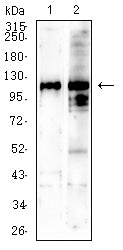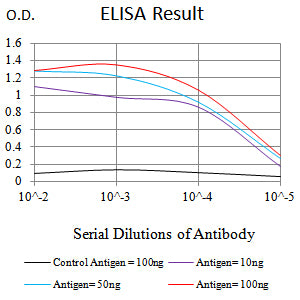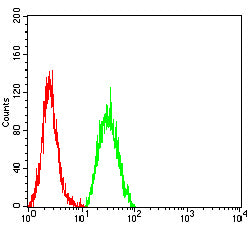


| WB | 1/500 - 1/2000 | Human,Mouse,Rat |
| IF | 咨询技术 | Human,Mouse,Rat |
| IHC | 咨询技术 | Human,Mouse,Rat |
| ICC | 技术咨询 | Human,Mouse,Rat |
| FCM | 1/200-1/400 | Human,Mouse,Rat |
| Elisa | 1/10000 | Human,Mouse,Rat |
| Aliases | DRRS; HSAL4; ZNF797; dJ1112F19.1 |
| Entrez GeneID | 57167 |
| clone | 7B6H2 |
| WB Predicted band size | 112kDa |
| Host/Isotype | Mouse IgG1 |
| Antibody Type | Primary antibody |
| Storage | Store at 4°C short term. Aliquot and store at -20°C long term. Avoid freeze/thaw cycles. |
| Species Reactivity | Human, Mouse |
| Immunogen | Purified recombinant fragment of human SALL4 (AA: 96-359) expressed in E. Coli. |
| Formulation | Purified antibody in PBS with 0.05% sodium azide |
+ +
以下是关于SALL4抗体的3篇参考文献及其简要摘要:
1. **《SALL4 is a novel diagnostic marker for testicular germ cell tumors》**
- **作者**: Cao D, Guo S, Allan RW, et al.
- **摘要**: 该研究通过免疫组化分析,发现SALL4抗体在多种生殖细胞肿瘤(如精原细胞瘤、卵黄囊瘤)中高度表达,而在非生殖细胞肿瘤中极少表达,提示SALL4可作为生殖细胞肿瘤诊断的敏感标记物。
2. **《SALL4 is a key regulator of pluripotency and embryonic development in humans》**
- **作者**: Yang J, Gao C, Chai L, Ma Y.
- **摘要**: 研究探讨SALL4在维持胚胎干细胞多能性中的作用,通过抗体检测发现SALL4与OCT4、NANOG等关键因子相互作用,调控干细胞的自我更新和分化。
3. **《SALL4 immunostaining in the differential diagnosis of ovarian and endometrial carcinomas》**
- **作者**: Miettinen M, Wang Z, McCue PA, et al.
- **摘要**: 通过对比SALL4抗体在卵巢癌和子宫内膜癌中的表达,发现其在高分化卵巢卵黄囊瘤和某些上皮性肿瘤中特异性高表达,有助于临床病理鉴别诊断。
4. **《SALL4 as a marker for hepatocellular carcinoma: A comparative study with existing markers》**
- **作者**: Lee TK, Cheung VC, Lu Y, et al.
- **摘要**: 研究评估SALL4抗体在肝细胞癌(HCC)中的表达,发现其敏感性优于AFP等传统标记物,尤其在低分化HCC中表现突出,可能成为肝癌诊断的补充工具。
以上文献均聚焦于SALL4抗体在肿瘤诊断和干细胞研究中的应用,涵盖生殖系统肿瘤、干细胞调控及肝癌等领域。
SALL4 (Sal-like protein 4) is a transcription factor belonging to the SALL family, characterized by zinc finger motifs that mediate DNA binding. It plays a critical role in embryonic development, particularly in maintaining pluripotency of stem cells and regulating organogenesis. SALL4 is highly expressed in early embryonic tissues and germ cells but is typically silenced in most adult somatic cells. However, its aberrant re-expression is strongly linked to malignancies, including germ cell tumors (e.g., yolk sac tumors, seminomas), certain leukemias, and solid cancers like hepatocellular and gastric carcinomas.
SALL4 antibodies are vital tools in diagnostic pathology and research. They are widely used in immunohistochemistry (IHC) to identify SALL4 protein expression, aiding in the diagnosis of germ cell tumors and distinguishing them from other neoplasms. In research, these antibodies help study SALL4's role in cancer progression, stem cell biology, and epigenetic regulation. Additionally, SALL4 overexpression correlates with poor prognosis in cancers, making it a potential therapeutic target.
Mutations in the *SALL4* gene are associated with congenital disorders like Townes-Brocks syndrome, highlighting its developmental importance. Recent studies also explore SALL4's interaction with signaling pathways (e.g., Wnt/β-catenin) and its utility in regenerative medicine. Despite its value, interpreting SALL4 antibody results requires caution due to potential cross-reactivity with other SALL family members. Ongoing research aims to refine its applications in both clinical and experimental settings.
×